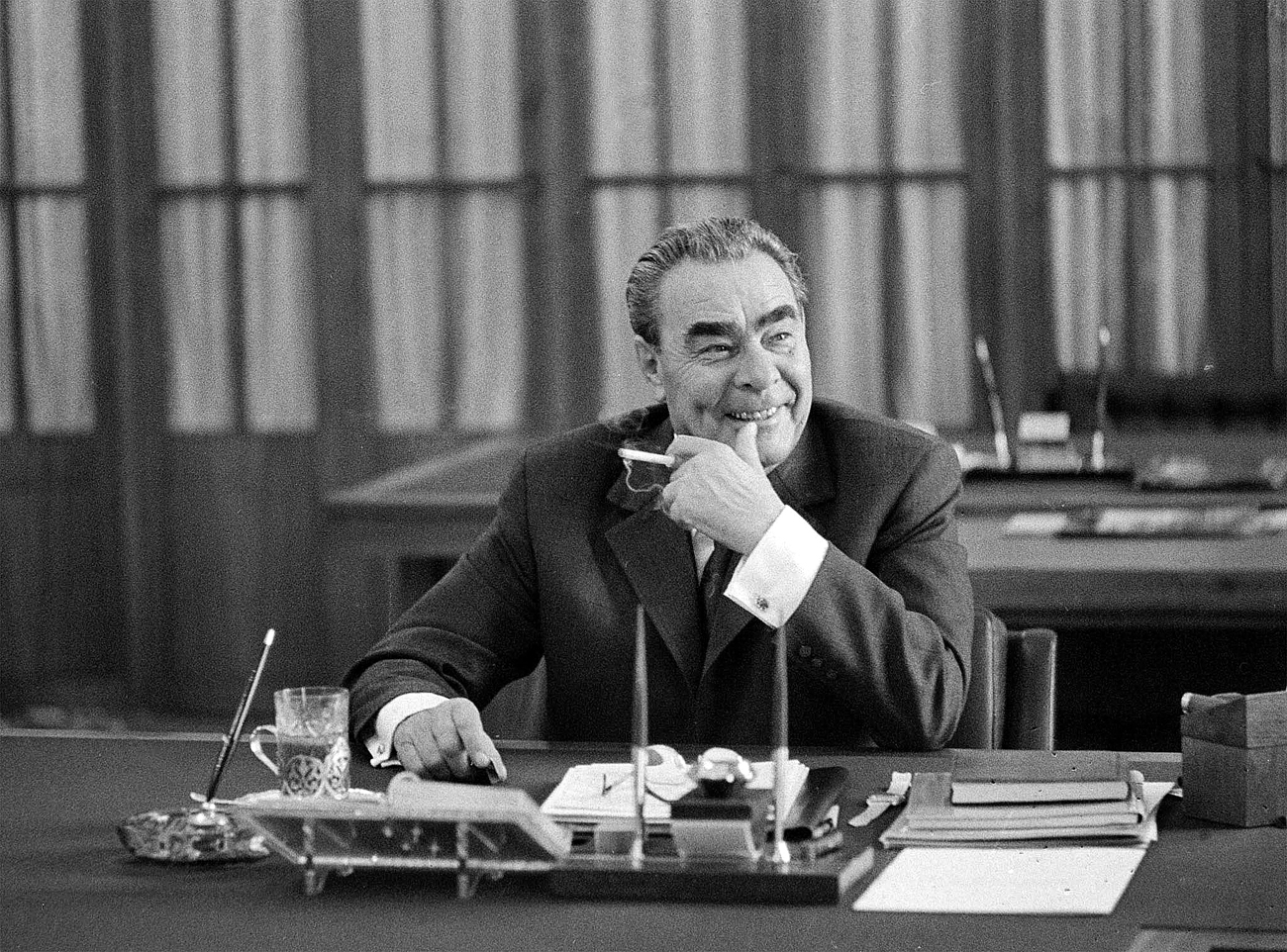
Even though Soviet citizens could get in trouble with the authorities for telling political jokes, during the Era of Stagnation, as the Brezhnev period was known, many people made fun of the all-seeing Communist Party and its leader. Photo: Leonid Brezhnev in his study in the Kremlin, Moscow.
Vladimir Musaelyan/TASSThe Brezhnev era was a golden age of Soviet political humor. It was a time of kissing politicians, absurd vanity and old men in the Politburo. All of this was reflected in anecdotes that were told in hushed voices across the Soviet Union.
Even though Soviet citizens could get in trouble with the authorities for telling political jokes, during the Era of Stagnation, as the Brezhnev period was known, many people made fun of the all-seeing Communist Party and its leader, who was often referred to in jokes as "our dear Leonid Ilyich." For example:
A man turns on the TV. On the first channel, dear Leonid Ilyich is delivering a speech. The man switches to the second channel: Brezhnev again. Channel three: still Brezhnev. He turns to the fourth channel, and it’s showing a KGB colonel who shakes his fist and warns: "You’d better stop changing channels…"
In addition to jokes about Brezhnev, there were jokes about the punishment that awaited those who told jokes:
“Leonid Ilyich, what’s your hobby?”
“I collect jokes about myself.”
“How many have you collected?”
“Two-and-a-half labor camps worth.”
Jokes sometimes compared Brezhnev to previous Soviet leaders. He was held up to Lenin, who founded the Soviet state and strove to create a socialist society, to the brutal dictator Stalin and to Khrushchev, who is remembered partly for his tendency to make peculiar statements. In jokes with this theme, Brezhnev was generally given the unenviable role of a leader who had allowed the country go off course:
Lenin proved that even female cooks could manage a country.
Stalin proved that just one person could manage a country.
Khrushchev proved that a fool could manage a country.
Brezhnev proved that a country doesn’t need to be managed at all.
Or:
With Lenin, it was like being in a tunnel: You‘re surrounded by darkness, but there’s light ahead.
With Stalin, it was like being on a bus: One person is driving, half the people on the bus are sitting [ed. “sitting” in Russian has a secondary meaning of doing time in prison] and the other half are quaking with fear.
With Khrushchev, it was like at a circus: One person is talking, and everyone else is laughing.
With Brezhnev, it was like at the movies: Everyone’s just waiting for the film to end.
Long before becoming general secretary of the Communist Party, Leonid Brezhnev fought in World War II. The defining moment of his military career was participating in the defense of the Malaya Zemlya (Little Land) bridgehead near Novorossiysk (760 miles south of Moscow).
In World War II history, the battle for Malaya Zemlya was not regarded as being particularly strategically significant, but in the first volume of Brezhnev's autobiography (published in 1978, after he had been in power for 12 years) it was depicted as one of the war’s key battles. According to literary critic Konstantin Milchin, the purpose of this interpretation, was "to explain that it was Brezhnev (a colonel at the time) in particular who won the Great Patriotic War."
This attempt to elevate Brezhnev’s importance in the war was not well received. The book was not a success, and Soviet citizens mocked its exaggerated depiction of Brezhnev's role in the war. One joke went:
Two veterans get into an argument. One says to the other: “While I was at Malaya Zemlya deciding the fate of the war, you were probably just twiddling your thumbs in Stalingrad.”
The Battle of Stalingrad, in which over a million Soviet soldiers died defending the city from a Nazi invasion between July 1942-February 1943, was actually one the most important battles of World War II and is regarded as a turning point in the war.
Another went:
On the eve of the Soviet storming of Berlin in May 1945, Stalin says to Marshal Zhukov: “Good plan, comrade Zhukov. But before approving it, I need to consult Colonel Brezhnev.”
One of Brezhnev's most famous characteristics was a tendency to kiss other world leaders. He would generally start with a peck on each cheek and then go in for a final kiss on the lips.
The most famous example was a kiss he shared with East German leader Erich Honecker. The kiss was immortalized in graffiti by Dmitri Vrubel on the remains of the Berlin Wall and remains one of the most iconic images of the Brezhnev period. Besides Honecker, Brezhnev kissed former United States President Jimmy Carter, Palestine Liberation Organization leader Yasser Arafat, Yugoslav leader Josip Broz Tito and India’s then prime minister Indira Gandhi. Some leaders, such as former British Prime Minister Margaret Thatcher, managed to avoid being kissed by Brezhnev. Sometimes this required a creative approach. It is rumored that Cuban revolutionary Fidel Castro lit up a cigar to prevent Brezhnev from kissing him. Romanian leader Nicolae Ceaușescu said he disliked kissing Brezhnev because he was afraid of bacteria. This led to a joke:
Brezhnev did not like Romanian leader Ceaușescu. “He's a grown man,” thought Leonid Ilyich, “and yet he still hasn't learned how to kiss.”
In the final years of the Brezhnev period, the majority of high-level government officials were, to put it mildly, extremely experienced. The average age of a Politburo member was 70, which gave rise to jokes such as:
-What has four legs and forty teeth?
-An alligator.
-And forty legs and four teeth?
-Brezhnev's Politburo.
All rights reserved by Rossiyskaya Gazeta.
Subscribe
to our newsletter!
Get the week's best stories straight to your inbox